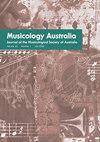A Post-mortem of a Pulped Book: Making Sense of the Missed Opportunities of Deadly Woman Blues
IF 0.4
0 MUSIC
引用次数: 0
Abstract
When new books are reviewed, they are normally in circulation and available for purchase. This is not true, however, of Deadly Woman Blues: Black Women & Australian Music by Clinton Walker, which was only recently released by NewSouth Publishing, the publishing arm of UNSW Press, in February 2018, yet withdrawn from sale within weeks due to numerous complaints from the very musicians whose work and achievements it sought to celebrate. Before reaching most bookstore shelves, Deadly Woman Blues was resoundingly condemned by several of the most prominent of those musicians via their social media posts, letters to the editor, and news commentaries. Criticized for the lack of consultation and consent sought by Walker from many of the living musicians it discussed, as well as for the many factual errors and historical distortions found within its pages, NewSouth Publishing (2018) announced that Deadly Woman Blues would be pulped on 5 March 2018 with all corrections to be posted on its website. Walker (2018b) issued his own apology, citing the book’s ‘errors of fact’, that same day. Walker had conceived of Deadly Woman Blues as a generally-chronological biographical encyclopaedia aimed at recognizing the often-overlooked histories and achievements of black women in Australian music. Although not unproblematic, the book did not stop with entries on Aboriginal and Torres Strait Islander musicians, but also extended to expatriate musicians of the African diaspora and Indigenous communities of other countries. Even so, Deadly Woman Blues was promoted as a sequel to Walker’s earlier book, the highly-successful Buried Country: The Story of Aboriginal Country Music (Walker 2000a), which had spawned a tie-in documentary film (Nehl 2000), two double-CD albums (Walker 2000b, 2015b) and a stage show (Walker 2016). Deadly Woman Blues would not, however, be received as the triumph that Buried Country had been.一本纸浆书的事后剖析:理解致命女人蓝调的错失机会
当新书被评论时,它们通常是流通的,可以购买的。然而,克林顿·沃克(Clinton Walker)的《致命女性蓝调:黑人女性与澳大利亚音乐》(Deadly Woman Blues: Black Women & Australian Music)却并非如此,这本书最近才于2018年2月由新南威尔士大学出版社(UNSW Press)旗下的新南方出版公司(NewSouth Publishing)发行,但在几周内就被撤下了销售,原因是这本书试图庆祝的音乐家们的作品和成就遭到了大量抱怨。在进入大多数书店货架之前,《致命女人蓝调》就遭到了几位最杰出的音乐家的强烈谴责,他们通过社交媒体帖子、给编辑的信和新闻评论。由于沃克没有征求许多在世音乐家的意见和同意,以及在其页面中发现的许多事实错误和历史扭曲,新南方出版社(2018)宣布,《致命女人蓝调》将于2018年3月5日出版,所有更正都将在其网站上公布。沃克(2018b)在同一天发表了自己的道歉,引用了这本书的“事实错误”。沃克设想的《致命女性蓝调》是一本大致按时间顺序编撰的传记百科全书,旨在表彰黑人女性在澳大利亚音乐界经常被忽视的历史和成就。虽然并非毫无问题,但这本书并没有止步于土著和托雷斯海峡岛民音乐家的条目,而且还扩展到非洲侨民和其他国家土著社区的外籍音乐家。即便如此,《致命女人蓝调》还是作为沃克早期作品《被埋葬的国家:土著乡村音乐的故事》(Walker 2000a)的续集被推广,后者非常成功,并催生了一部与之相关的纪录片(Nehl 2000),两张双cd专辑(Walker 2000b, 2015b)和一场舞台表演(Walker 2016)。然而,《致命女人蓝调》并没有像《埋葬的乡村》那样获得成功。
本文章由计算机程序翻译,如有差异,请以英文原文为准。
求助全文
约1分钟内获得全文
求助全文

 求助内容:
求助内容: 应助结果提醒方式:
应助结果提醒方式:


